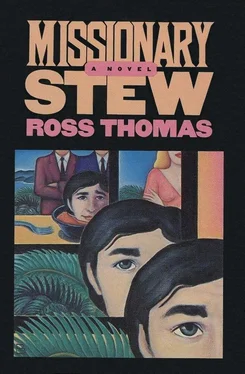Ross Thomas - Missionary Stew
Здесь есть возможность читать онлайн «Ross Thomas - Missionary Stew» весь текст электронной книги совершенно бесплатно (целиком полную версию без сокращений). В некоторых случаях можно слушать аудио, скачать через торрент в формате fb2 и присутствует краткое содержание. Город: New York, Год выпуска: 1983, ISBN: 1983, Издательство: Simon & Schuster, Жанр: Политический детектив, на английском языке. Описание произведения, (предисловие) а так же отзывы посетителей доступны на портале библиотеки ЛибКат.
- Название:Missionary Stew
- Автор:
- Издательство:Simon & Schuster
- Жанр:
- Год:1983
- Город:New York
- ISBN:978-0-671-49363-9
- Рейтинг книги:3 / 5. Голосов: 1
-
Избранное:Добавить в избранное
- Отзывы:
-
Ваша оценка:
- 60
- 1
- 2
- 3
- 4
- 5
Missionary Stew: краткое содержание, описание и аннотация
Предлагаем к чтению аннотацию, описание, краткое содержание или предисловие (зависит от того, что написал сам автор книги «Missionary Stew»). Если вы не нашли необходимую информацию о книге — напишите в комментариях, мы постараемся отыскать её.
Missionary Stew — читать онлайн бесплатно полную книгу (весь текст) целиком
Ниже представлен текст книги, разбитый по страницам. Система сохранения места последней прочитанной страницы, позволяет с удобством читать онлайн бесплатно книгу «Missionary Stew», без необходимости каждый раз заново искать на чём Вы остановились. Поставьте закладку, и сможете в любой момент перейти на страницу, на которой закончили чтение.
Интервал:
Закладка:
Citron turned to look up at the clock on the post-office wall. He still owned no watch and sometimes doubted that he ever would again. The post-office clock read 4:32. The ACLU reception with its promise of free food and drink was from 5:00 to 7:30. Citron found the public washroom and inspected himself in the mirror. He had clipped his gunfighter mustache the day before, just after one of the Cadillac People had given his gray-streaked brown hair a free trim along with a fanciful story about having once been Sinatra’s favorite barber in Tahoe.
As for clothes, Citron was wearing a clean blue button-down shirt, a worn but still good tweed jacket, faded jeans, and presentable brown loafers. It was a uniform that in Los Angeles would enable him to pass for either a sincere probation officer or a rich producer.
At the ACLU fund-raiser in Bel-Air, Citron managed to put away a quarter of a pound of assorted cheese, a half-dozen cocktail sausages, perhaps fifteen Triscuits, and two glasses of white wine before he was discovered by Craigie Grey, the actress, questioned sharply, and hired on the spot as the resident manager of her Malibu beach apartment building.
Upon turning thirty-two in 1971, Craigie Grey had taken a long bleak look at herself in a three-way mirror and a week later put every dime she could raise into a down payment on the two-story, eight-unit beach apartment building on the Pacific Coast Highway a block or so from the pier in what was generally conceded to be one of Malibu’s less ritzy sections.
The redheaded film actress bought the apartment building as both an investment and a hedge against what she called the three Fs — Fat, Fifty, and Forgotten. She also bought shrewdly and cheaply, bargaining the price down to less than three-quarters of a million. Eleven years later it was still worth four, possibly five times what she paid for it. Some said six.
On that unseasonably warm November evening when she hired Citron (despite his murmured protestations that his inability to fix anything broken, either mechanical or spiritual, just might border on criminal negligence), Craigie Grey raised a glass of white wine to her broad, grin-prone mouth, sipped it, and stared at him over the glass’s rim with her bluebonnet-blue eyes. A native of Longview in East Texas, which she had left thirty years ago when she was twelve (or six to hear her tell it now), her birthplace could still be detected in the softly twanged vowels that glided in and out of her speech.
“How long were you in there, all in all?” she said, lowering her glass.
“All in all, not quite thirteen months,” Citron said.
Her next question was predictable — at least to Citron. But first there was to be the inevitable hesitation while the battle with prurience was fought. As usual, prurience won.
“Was he really a cannibal like they all said?”
Citron shrugged his answer, or lack of it, as he almost always did when asked that particular question. He reached for another Triscuit on which he placed a large chunk of cheese that turned out to be Monterey jack. They were standing next to the table where the wine and cheese were being served. Craigie Grey was there to make the fund-raiser’s principal speech. Citron, of course, had come for the grub.
“You don’t like to talk about it,” Craigie Grey said in a tone that mingled sympathy with disappointment.
“It’s not my favorite topic,” Citron admitted.
Craigie Grey nodded and changed the subject. “You used to move around a lot, didn’t you?” she said. “Overseas, I mean.”
“Yes. A lot.”
“Why’d you come back here? I mean to L.A. You’re not from here.”
“No.”
Craigie Grey waited for him to answer her latest question. Citron seemed to be thinking about it. “The weather,” he said finally, as though the answer came as a surprise even to him. “I got used to a warm climate. I don’t much like the cold anymore.”
The answer seemed to satisfy her, because she raised the wineglass to her mouth again, drank, put the glass down, and turned back to Citron, her attitude suddenly crisp and businesslike.
“I’ll tell you what it pays,” she said.
“All right.”
“It pays four hundred a month and you get the grungy downstairs back unit free — that’s the one on the highway.”
Citron decided he should at least appear to consider it. He counted to five and said, “Okay. Fine.”
“If something goes kaput, call a plumber or a carpenter or an electrician. Whatever. I’ll give you a list of numbers. It’s cheaper in the long run. Professional maintenance, I mean.”
“All right.”
“I’ve only got two rules. Maybe three. Don’t rent to any coke dealers or whore ladies. And anyone who doesn’t come up with their rent by the tenth of the month is out on their ass. No exceptions. Okay?”
Citron nodded. “Okay.”
“Then you’re hired,” she said.
Out of loyalty and gratitude to his new employer, Citron sat through her speech, which turned out to be predictably gloomy and uncommonly trenchant. When the pledge cards were passed around, he pocketed his and told a vaguely familiar-looking young television actress that he’d mail his check in.
Chapter 4
The name that Jack Replogle signed to checks and contracts was John T. Replogle. The T stood for Townsend. He built things. Or rather Replogle Construction, Inc., did. With its headquarters in Denver and offices in Jidda and Rome and Singapore, it built things all over the world — roads, docks, airfields, hospitals, pipelines, virtually anything. Replogle was the firm’s president and chief executive officer. He was both very rich and very smart, and if he had a hobby, it was politics.
Over the years Replogle had come to specialize in political fund-raising, which he always called “shaking down the flush-bottoms back East” — although back East to Replogle could mean Dallas or Tulsa or Kansas City or Chicago. Over the years he had shaken them down for close to forty million dollars.
It was around 10:00 when he and Draper Haere stopped in Idaho Springs for breakfast, a meal Haere had never been able to do without. Although he regularly skipped lunch, Haere could never deny himself breakfast, which was invariably the same: two eggs over easy; bacon or sausage; toast and hash browns, or — if he was in the South — grits. He had grown fond of grits in Birmingham.
Haere noticed the big high-sprung dark-blue pickup truck when they pulled into the café. It was a Dodge. He noticed it because of the angle parking that made it almost impossible not to read the sticker plastered across the pickup’s tailgate. The sticker read: “Is There Life After Death? Fuck with This Truck and Find Out.”
Replogle ordered only coffee, which he scarcely touched. He told Haere he didn’t eat much anymore and that the drugs he had to take made everything taste like brass. For some reason, however, the drugs didn’t affect the taste of liquor, so he was drinking more than he probably should, although at this point in his life he didn’t think anyone was bothering to keep score.
Back in the station wagon, Replogle again buckled his seat belt, and again Haere didn’t. But this time Replogle failed to go through the fighter-pilot-goggles business, either because he forgot, or because he thought that once a day for the old joke was enough.
They drove in silence for five minutes or so admiring the scenery. It had also snowed the night before in the mountains, and there was a seasonal accumulation of three or four feet on level ground and much deeper than that in the drifts. The snowplows had already been through that morning, and the highway was clear and even dry in places where the sun had managed to get at it.
Читать дальшеИнтервал:
Закладка:
Похожие книги на «Missionary Stew»
Представляем Вашему вниманию похожие книги на «Missionary Stew» списком для выбора. Мы отобрали схожую по названию и смыслу литературу в надежде предоставить читателям больше вариантов отыскать новые, интересные, ещё непрочитанные произведения.
Обсуждение, отзывы о книге «Missionary Stew» и просто собственные мнения читателей. Оставьте ваши комментарии, напишите, что Вы думаете о произведении, его смысле или главных героях. Укажите что конкретно понравилось, а что нет, и почему Вы так считаете.












